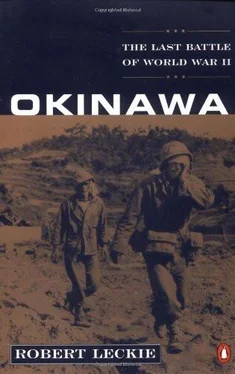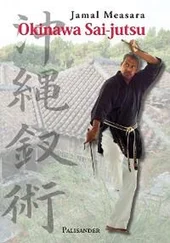Despite the undoubted exuberance of this nonviolent social revolution (sometimes comical to a Westerner at first sight of a smaller Japanese going to his daily workplace in a tuxedo hanging on him like a scarecrow’s suit and a top hat reaching down to his ears), the change was outward only; Japan, for all of its pretensions to democracy, remained a paternalistic, authoritarian state. The secret police organized in the 1600s may have been banned, but the new Japan replaced them with Thought Police, censors and spies sniffing out sedition and “suspicious” activity like tireless bloodhounds, and empowered like the Samurai of old to put to death anyone caught doing “anything different.” In classrooms and army barracks young Japanese were taught to glory in Nippon’s military traditions, to believe that dying on the battlefield for the emperor was the most sublime fate to which a man could aspire.
Inevitably the spirit of the Samurai returned and their code of Bushido was revived. Soldiers of a mainly peasant army, both officers and men, were trained in the hard, selfless Samurai school, taught to think of themselves as heirs of that departed warrior class. Officers adopted a so-called Samurai saber, much like the two-handed long sword of old, as their badge of rank. Properly sharpened and even though wielded by diminutive Japanese, it could sever a prisoner’s head at a single stroke, and this summary execution of captives—usually after they had been tortured for information—became one of the least gruesome features of Japan’s new, Samurai -led army as it took the field in pursuit of territorial conquest and the raw materials and markets in which Nippon, for a modern industrial nation, was so deplorably deficient. Eventually the chief officers among them emerged as the War Lords of Japan. In collusion with the zaibatsu —leading politicians, bureaucrats, and industrialists such as the Mitsubishi and Mitsui families—the War Lords ruled the country through the figurehead of Hirohito.
This career of territorial aggrandizement by an authoritarian coalition began in 1879 with Nippon’s annexation of the Ryukyu Islands, of which Okinawa was the largest. Sixty-six years later three typical Samurai took charge of defending this last barrier between American armed forces and the Home Islands of Japan.
Lieutenant General Mitsuru Ushijima—commander of the Japanese Thirty-second Army—may be said to have been the Samurai beau ideal. Ramrod-straight and lean, sharp-featured with a graying military brush mustache, he was able to awe subordinates by his unshakable composure and iron self-control. Yet he was a considerate man whose staff not only respected but even revered him. Ushijima’s style was low-key. He abstained from the rough-and-tumble of staff discussions of policy, plans, or operations; in which, as had happened during the Guadalcanal disaster, irate officers could actually come to blows. Rather, he let his aides make the decisions, which he would either approve or reject. But he always took responsibility for the results, good or bad. In their unreserved admiration of him, his idolizing staff compared him to Takamori Saigo, a celebrated hero of the Meiji Restoration.
Early in the war Ushijima had distinguished himself as an infantry group commander during the conquest of Burma. There he met Isamu Cho, chief of staff of the Southern Army. They returned to Tokyo together, Ushijima to become commandant of the Japanese Military Academy, Cho to serve on the General Military Affairs Bureau. They also came to Okinawa together, Ushijima as the Thirty-second’s chief, Cho as his chief of staff—and no two men could differ more in character.
Ushijima the serene was a man of presence, capable of inspiring his subordinates. He also possessed the rare gift of seeing his own incapacities, which he filled by choosing Major General Cho, a firebrand and a planner and organizer, strict but resourceful, aggressive, and so invincibly explosive in argument as to be unpopular. Deceptively scholarly-looking with thick wide spectacles that exaggerated his owlish features, he was actually—in contrast to the Spartan, abstemious Ushijima—a bon vivant. In his quarters, even toward the end of the battle for Okinawa, might be found unrivaled meals, the best Scotch whiskey, the finest sake, and the prettiest women. The burly Cho was also something of a bully, and the young officers who served him resented his hectoring tirades, even though they admitted that he could make them work harder than any other officer.
Isamu Cho had risen at fifty-one to the rank of lieutenant general and was in line for another star. In 1930, while a captain, he had joined the Sakura-kai , or “Cherry Society,” whose hundred-odd members—all firebrands like Cho—were sworn to cleanse Japan of all Western influences that they considered inimical to the ancient virtues of the Samurai. Antidemocratic and anticapitalist, they sought to establish a military dictatorship and had chosen the cherry tree as their emblem because its brilliant though short-lived blossoms symbolized the warrior Samurai ’s readiness to die for the emperor at any moment.
A few generals eager to wear the dictatorial mantle courted the Cherry favor, and thus contributed to the society’s increasing influence and to Cho’s emergence as the leading hothead and strong-arm advocate. In January 1931, he helped plot a conspiracy to murder the prime minister and replace him with a leading general, but that distinguished officer declined to accept the honor, since he seems to have expected to gain that eminence by legal means. In October the Cherries tried again, with Cho once more the leader. The plan was to have revolutionaries fly over Tokyo to bomb selected targets, chief among them the prime minister’s residence. With him dead, Emperor Hirohito could be compelled to choose a general as his successor. However, Cho’s very exuberance foiled the plot. At one of the meetings, held in a geisha house in Tokyo’s red-light district, he declared that the conspiracy must succeed “even if it is necessary to threaten the emperor with a drawn dagger.” To one Cherry member this was treasonous talk indeed, and after he blew the whistle, Japanese military police raided a geisha house to arrest the ringleaders—Cho not included—and put an end to the notorious plot of “the Brocade Banner.”
In any other army Cho’s activity would at least have led to his being court-martialed or even executed, but instead of being punished he was rewarded with a coveted assignment to the Kwantung Army, then engaged in ripping the province of Manchuria from the flabby big body of the Chinese giant. Nor was the public as outraged as it might have been by the Brocade Banner affair, for in those days a man who excused his misdeeds by wrapping himself in the flag of patriotism was forgiven almost anything. Gradually, however, as the militarists tightened their hold on Japan, any kind of opposition to the status quo, no matter how supposedly patriotic, was not so conveniently ignored.
Nevertheless Cho did not—could not—restrain himself. In 1938 he nearly provoked a war between Japan and the Soviet Union when he and another officer ordered an unauthorized attack on Russian forces just over the Manchurian border. Three years later, as chief of staff of the army that had seized Thailand, he seems to have encouraged hostilities between Thai and Vichy French troops. Yet, he remained in the high command’s mystifyingly good graces, much to the dismay of generals senior to him who also sought the Okinawa assignment. Perhaps Imperial Headquarters believed that Cho’s very excess of zeal could now be helpful rather than detrimental to the army. If the fires burning in his breast could rekindle the ardor of the soldiers on Okinawa, then another kind of kamikaze might yet overwhelm superior American firepower and save Japan.
Читать дальше










